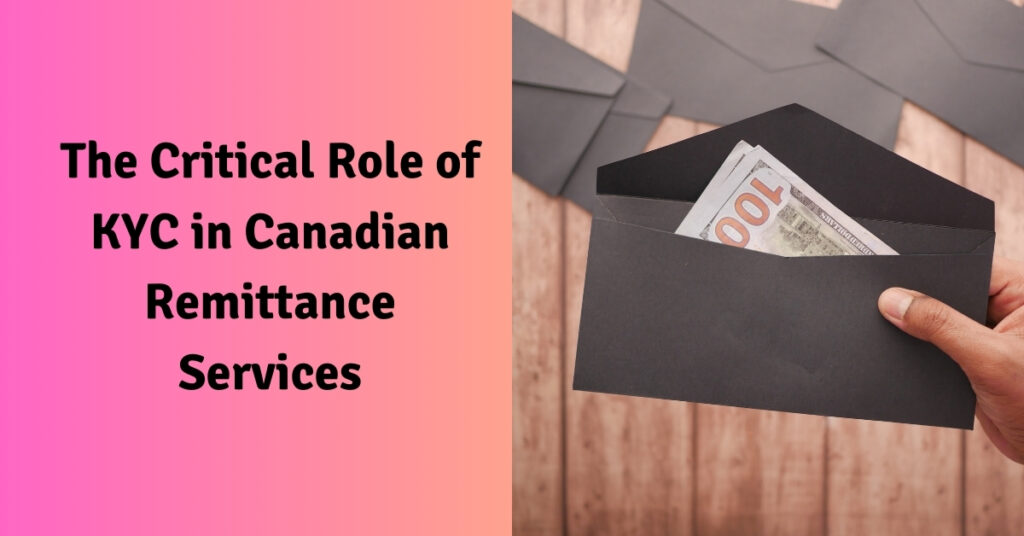The Critical Role of KYC in Canadian Remittance Services
A report from the Canadian Bankers Association reveals that over 80% of Canadian banks have experienced a notable decrease in fraud and improved security due to comprehensive Know Your Customer (KYC) procedures. This finding highlights the vital role of KYC protocols in protecting financial transactions, including remittances from Canada to India. By confirming customer identities and ensuring only legitimate transactions are processed, KYC measures help maintain financial system integrity and deter fraudulent activities. This article will explore the significance of KYC in Canadian remittance services, its function in securing money transfers, and the protection it provides against fraud. The Importance of KYC in Canadian Remittance Services KYC protocols are vital for verifying the identity of remittance service customers. This process involves gathering and validating documents to confirm the customer’s claimed identity. In Canadian remittance services, KYC helps establish trust and ensure a secure and transparent remittance process. KYC’s Role in Securing Money Transfers from Canada to India KYC plays a crucial role in safeguarding Canada to India money transfers by: Preventing Fraud: Identity verification through KYC helps prevent illegal activities like money laundering and identity theft. Ensuring Compliance: Following KYC requirements ensures remittance providers adhere to international and local regulations, minimizing legal risks. Building Trust: Customers feel more secure knowing stringent KYC protocols protect their personal information and funds. Secure Transactions: KYC ensures only verified individuals can send and receive money, reducing fraudulent transaction risks. Customer Confidence: Knowing their identity is protected increases customer confidence in using remittance services. Variation in KYC Requirements Among Remittance Providers KYC requirements can differ depending on the remittance provider. Some may have stricter requirements, while others offer a more streamlined process. For instance, Onfido, a leading KYC verification service, provides varying levels of verification based on the provider’s risk management policies. Key Points: Provider Policies: Different providers may have varying KYC policies based on their risk tolerance and regulatory environment. Customer Experience: Some providers may offer quicker and more user-friendly KYC processes to enhance the customer experience. Information Required for KYC Verification in Canada For KYC verification, customers typically need to provide: Identification Documents: Such as a passport, driver’s license, or national ID card. Proof of Address: Utility bills or bank statements. Additional Documentation: Depending on the provider, extra information like a selfie for facial verification or proof of income may be required. Document Submission: Customers must submit valid documents to verify their identity and address. Verification Process: The remittance provider verifies the submitted documents to ensure authenticity. Protecting Personal Information During the KYC Process Customers can take several steps to ensure their personal information is protected during the KYC process: Choose Reputable Providers: Use remittance services from trustworthy providers known for robust data protection measures. Verify Privacy Policies: Ensure the provider’s privacy policy clearly outlines how personal information is collected, used, and protected. Use Secure Channels: Submit KYC documents through secure and encrypted channels to prevent data breaches. Monitor Accounts: Regularly check accounts for any suspicious activity and report any concerns to the provider immediately. Conclusion KYC is a fundamental component of secure remittance services, ensuring that money transfers from Canada to India are safe, compliant, and efficient. By verifying customer identities, remittance providers can protect against fraud, build trust, and maintain regulatory compliance. For customers, this means peace of mind knowing their transactions are secure and their personal information is protected. Embracing KYC not only enhances the security of financial transactions but also fosters a more trustworthy and reliable remittance ecosystem. FAQs’ 1. How does KYC compliance benefit both the customer and the remittance service provider? Ans- KYC compliance ensures secure transactions by verifying customer identities, reducing fraud risk, and building trust between customers and service providers. 2. What are the consequences of not complying with KYC regulations in remittance services? Ans- Non-compliance can result in legal penalties, loss of customer trust, and increased vulnerability to fraud and money laundering activities. 3. How does KYC ensure the security of money transfers from Canada to India? Ans- KYC verifies the identity of customers, preventing unauthorized transactions and reducing the risk of fraudulent activities in the remittance process. 4. Are there any specific KYC regulations for non-residents using remittance services in Canada? Ans- Yes, non-residents may need to provide additional documentation, such as proof of residency and identification, to comply with Canadian KYC regulations. 5. How can customers ensure their personal information is protected during the KYC process? Ans- Customers should use reputable remittance providers that implement robust data protection measures and adhere to privacy regulations to safeguard personal information. 6. What documents do I need to complete the KYC process for remittance services? Ans- You’ll usually need ID proof like a passport or driver’s license and a document showing your address, like a utility bill. 7. How long does the KYC verification process take? Ans- It depends on the provider, but many remittance services complete KYC verification in a few hours to a couple of days. 8. Can I send money without completing KYC verification? Ans- No, KYC is required by law to ensure secure and legal transactions. 9. Why do remittance services ask for additional documents during KYC? Ans- Some providers may request extra documents for higher security or when sending large amounts, to reduce fraud risks. 10.Do all remittance providers in Canada have the same KYC requirements? Ans- No, each provider may have different KYC steps depending on their security policies and local regulations.
